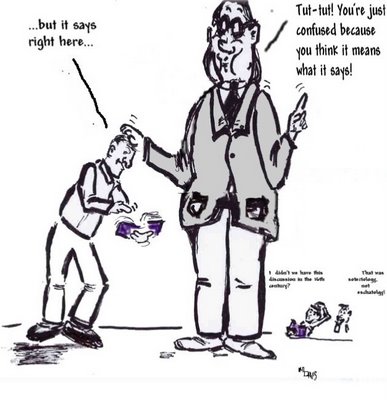The Lamb
Again the next day after John stood, and two of his disciples; and looking upon Jesus as He walked, he saith, "Behold the Lamb of God!"
John 1: 35-36
In this narrative the apostle John relates the testimony of John the Baptist concerning Jesus, and the apostle tells us that John the Baptist referred to Jesus as "the Lamb of God". The chapter also indicates that the previous day the Baptist had called Jesus "the Lamb of God, which taketh away the sin of the world."(v.29). The reference to Christ as the Lamb of God designates that Jesus fulfills the entire Old Testament sacrificial system. By offering Himself on the cross, He accomplished what the previous Temple sacrifices could only foreshadow: He became the propitiation, or expiation, or atoning sacrifice, for our sins (1 John 2: 2). He was the Sacrifice which once and for all satisfied God's holy demand for justice. Hebrews 9: 22 points out that "without the shedding of blood" there "is no remission" of sins, and Hebrews 10: 1-2 establishes that the only acceptable sacrifice is the Lamb of God Himself, Jesus Christ. It is His precious blood which has redeemed us from sin and death (1 Peter 1:19, Romans 8:3).
In fact, the writer of the epistle to the Hebrews goes into great detail in chapters 9 and 10 to show that the sacrificial system of the Levitical priesthood was never intended to be the solution for sinners in need of redemption: " For the Law, since it has only a shadow of the good things to come and not the very form of things, can never by the same sacrifices year by year, which they offer continually, make perfect those who draw near." (Hebrews 10: 1 NASB).
Rather, the Levitical requirements demonstrated graphically that the Law requires justice which must be satisfied even when forgiveness is offered, and that no sacrifice from man can ever atone for sins or satisfy justice. Hebrews 10: 11 depicts the Temple priest standing daily, "ministering and offering time after time the same sacrifices which can never take away sins;" (NASB), indeed, Josephus records that in the last days before the temple's destruction in the first century, at one passover more that 250 thousand sacrifices were offered in a two-hour period! And yet, as the writer of Hebrews points out, not only did the temple sacrifices never truly remit sins, but after the perfect sacrifice offered by Christ, any further temple offerings were invalid because The Lamb of God had come and fulfilled all that the previous offerings had foreshadowed of Him (Hebrews 9:28, 10: 12,14, 18). He alone could satisfy the demand for justice in His atoning sacrifice offered at the cross.
The Old Testament sacrifices are a constant reminder throughout that era that the remission of sins would require payment, and that to be propitiatory, the sacrificial offering would have to be worthy and be sufficient to satisfy justice. The cross of Jesus both demonstrates and fulfills this requirement for all eternity. Those who recoil at the idea that the penalty for sin must be paid by an innocent Substitute have not come to appreciate how difficult the forgiveness of sins is to accomplish. Those who have been ransomed by the Lamb will praise Him in glory (Revelation 5: 8-14).


